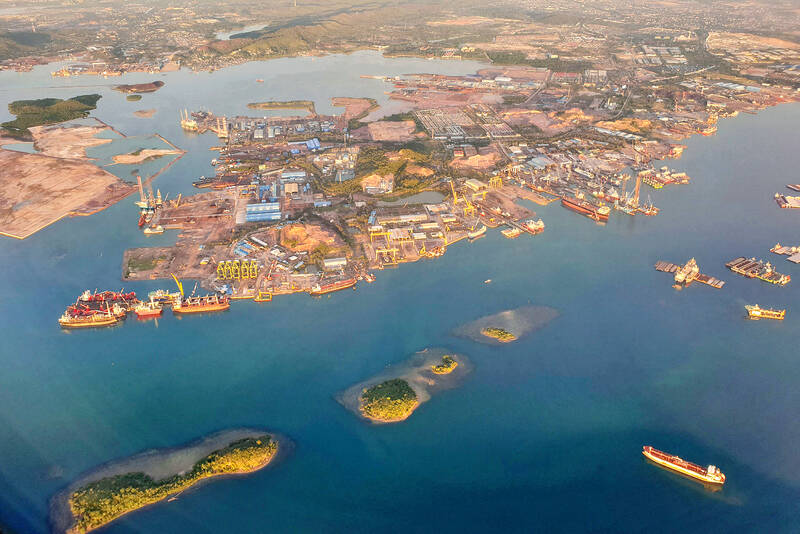Indonesia has sent hundreds of riot police to a tiny island after protests broke out against a China-backed project that would displace thousands of residents.
About 1,000 people protested in Batam City on Monday over a plan to develop Rempang island into a Chinese-funded economic zone, including the construction of a multibillion-dollar glass factory, that would displace about 7,500 people.
Some protesters clashed with security forces outside a government agency, wielding machetes, Molotov cocktails and stones, police said, adding that dozens were arrested.

Photo: Reuters
Beijing has poured money into infrastructure and resource projects in Southeast Asia’s biggest economy and its investments have previously caused social unrest, including a deadly January riot at a nickel smelting facility on Sulawesi island.
Police in Riau Islands province, near Singapore, said that 200 officers from the mobile brigade riot police unit known as Brimob were dispatched to the scene on Thursday.
“They are from Riau Province’s mobile brigade. The deployment is ... to create security,” police spokesman Zahwani Pandra Arsyad told reporters. “This is a precautionary step to ... maintain security as Batam, Riau Islands is strategic [for] people to do business and invest.”
Arsyad said the length of deployment “depends on the situation.”
Monday’s unrest took place outside a building of BP Batam, the agency that oversees the region’s development.
Jakarta secured a reported US$11.5 billion investment pledge from Xinyi Glass Holdings (信義玻璃控股有限公司), the world’s biggest glass producer, to build the factory during a visit by Indonesian President Joko Widodo to the Chinese city of Chengdu in July.
Widodo responded to the unrest on Thursday, saying that anger against the project was caused by miscommunication that could have been prevented if relocation package details were properly explained.
BP Batam has said the packages would include rent and meal compensation.
The government says the development will create tens of thousands of jobs for Indonesians.
It aims to attract more than 300,000 jobs by 2080, according to officials, who have not said when the project is expected to be finished.

WAITING GAME: The US has so far only offered a ‘best rate tariff,’ which officials assume is about 15 percent, the same as Japan, a person familiar with the matter said Taiwan and the US have completed “technical consultations” regarding tariffs and a finalized rate is expected to be released soon, Executive Yuan spokeswoman Michelle Lee (李慧芝) told a news conference yesterday, as a 90-day pause on US President Donald Trump’s “reciprocal” tariffs is set to expire today. The two countries have reached a “certain degree of consensus” on issues such as tariffs, nontariff trade barriers, trade facilitation, supply chain resilience and economic security, Lee said. They also discussed opportunities for cooperation, investment and procurement, she said. A joint statement is still being negotiated and would be released once the US government has made

Authorities have detained three former Taiwan Semiconductor Manufacturing Co (TMSC, 台積電) employees on suspicion of compromising classified technology used in making 2-nanometer chips, the Taiwan High Prosecutors’ Office said yesterday. Prosecutors are holding a former TSMC engineer surnamed Chen (陳) and two recently sacked TSMC engineers, including one person surnamed Wu (吳) in detention with restricted communication, following an investigation launched on July 25, a statement said. The announcement came a day after Nikkei Asia reported on the technology theft in an exclusive story, saying TSMC had fired two workers for contravening data rules on advanced chipmaking technology. Two-nanometer wafers are the most

NEW GEAR: On top of the new Tien Kung IV air defense missiles, the military is expected to place orders for a new combat vehicle next year for delivery in 2028 Mass production of Tien Kung IV (Sky Bow IV) missiles is expected to start next year, with plans to order 122 pods, the Ministry of National Defense’s (MND) latest list of regulated military material showed. The document said that the armed forces would obtain 46 pods of the air defense missiles next year and 76 pods the year after that. The Tien Kung IV is designed to intercept cruise missiles and ballistic missiles to an altitude of 70km, compared with the 60km maximum altitude achieved by the Missile Segment Enhancement variant of PAC-3 systems. A defense source said yesterday that the number of

Taiwanese exports to the US are to be subject to a 20 percent tariff starting on Thursday next week, according to an executive order signed by US President Donald Trump yesterday. The 20 percent levy was the same as the tariffs imposed on Vietnam, Sri Lanka and Bangladesh by Trump. It was higher than the tariffs imposed on Japan, South Korea and the EU (15 percent), as well as those on the Philippines (19 percent). A Taiwan official with knowledge of the matter said it is a "phased" tariff rate, and negotiations would continue. "Once negotiations conclude, Taiwan will obtain a better